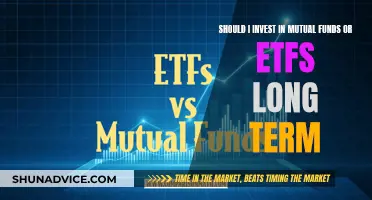
Individual Savings Accounts (ISAs) are a popular investment vehicle in the UK, with a total market worth of £741.6 billion. ISAs are tax-efficient investment accounts that protect returns on investments from income tax and capital gains tax. There are several types of ISAs, including cash ISAs, stocks and shares ISAs, junior ISAs, lifetime ISAs, and innovative finance ISAs. The annual ISA contribution limit for adults is £20,000, and individuals can choose from a wide range of investment options, including funds, investment trusts, bonds, and shares. When choosing ISA funds, it is important to consider one's risk tolerance, investment goals, and time horizon. While past performance does not guarantee future results, some of the best-performing ISA funds over the past year and the past 25 years include those focused on technology, artificial intelligence, global equities, and Indian equities.
What You'll Learn
- ISA funds are a tax-efficient way to hold a diversified portfolio of investments
- ISA funds can hold a wide range of asset classes, including shares, investment trusts, bonds, and gilts
- ISA funds can be actively or passively managed
- ISA investors should be prepared to invest for at least five years
- ISA investors can consult independent financial advisors or use digital wealth managers for investment advice

ISA funds are a tax-efficient way to hold a diversified portfolio of investments
An Individual Savings Account (ISA) is a tax-efficient way to hold a diversified portfolio of investments. With an ISA, you don't pay tax on interest or dividends you receive, and any profits from investments are free of capital gains tax. This makes it an ideal wrapper for a wide range of different investment products, including stocks and shares, unit trusts, investment funds, exchange-traded funds, individual stocks, corporate and government bonds, and Open Ended Investment Companies (OEICs).
The tax-efficient nature of ISAs means you can make the most of your investments without paying tax on your returns. This is particularly beneficial if you're investing for the long term and want to maximise your gains over time.
When choosing the funds for your ISA, it's important to consider your investment goals and whether each fund will contribute to building a diversified and balanced portfolio. While it can be helpful to see what other customers are investing in, it's essential to remember that these choices may not be suitable for your personal circumstances.
If you're new to investing, multi-asset funds are often a good starting point as they split your money across a range of different assets. As your wealth grows and you become more comfortable with the market, you can consider expanding your portfolio holdings to include a wider variety of investments.
By utilising the tax benefits of an ISA, you can hold a diversified portfolio of investments in a tax-efficient manner, maximising your returns over time.
Vanguard Index Fund: Minimum Investment Requirements and Opportunities
You may want to see also

ISA funds can hold a wide range of asset classes, including shares, investment trusts, bonds, and gilts
Individual Savings Accounts (ISAs) are a great way to protect the returns on your investments from income tax and capital gains tax. Stocks and shares ISAs are a type of ISA that allows you to invest in the stock market without paying tax on any growth in prices.
Shares are simply divided-up units of the value of a company. For example, if a company is worth £100 million and there are 50 million shares, each share is worth £2. Shares can be bought and sold, and their value fluctuates based on the performance and decisions of the company.
Investment trusts are professionally managed funds that invest in the shares of other companies. They are a collective investment vehicle, allowing investors to pool their money and invest in a diversified portfolio of stocks, bonds, or other assets. Investment trusts are traded on stock exchanges, and their value is determined by the market.
Bonds are a type of loan taken out by companies or governments. When you buy a bond, you are essentially lending money to the issuer, who will pay you a fixed rate of interest (coupon) over a set period. At the end of the term, the issuer will repay the original amount (capital) to the bondholder.
Gilts are a specific type of bond issued by the UK government. They are considered low-risk investments as they are backed by the government, which guarantees to repay the original amount at the end of the term.
By including these different asset classes in your ISA, you can diversify your portfolio and potentially reduce risk. Diversification is a risk management strategy that involves spreading your investments across various assets, industries, or countries. This helps to lower your exposure to any single investment or market, as the performance of different assets may vary over time.
It is important to note that investing in ISA funds comes with risks. The value of your investments can go down as well as up, and there is no guarantee of positive returns. Always consider your investment goals, risk tolerance, and time horizon before investing.
Hedge Fund Managers: Where to Find Their Investment Theses
You may want to see also

ISA funds can be actively or passively managed
When deciding which ISA fund to invest in, you will need to consider whether to buy active or passive funds, or a combination of the two. ISA funds can be actively or passively managed.
Active funds
Active funds are managed by a fund manager and a team of researchers who select the shares they believe will perform the best. The fund manager's skill, combined with their research capabilities, allows them to identify shares that are likely to excel. Active funds are more expensive as the fund manager's salary and resources cost money. A typical active fund will charge between 0.75% and 1% a year, which is generally higher than most passive funds.
Passive funds
Passive funds, on the other hand, mirror the ups and downs of a specific market index. They aim to replicate the performance of an index rather than trying to buy the best shares. Passive funds are typically cheaper than active funds, with a yearly charge of 0.1% to 0.2%. Due to the impact of fees, passive funds tend to outperform active funds on average.
Passive funds that follow a market-capitalisation-weighted approach are destined to own yesterday's stock market winners. This could be dangerous if there is a sustained shift from growth stocks to value stocks performing best. Active funds, on the other hand, have the flexibility to search for "tomorrow's winners", such as small companies that could one day become big businesses. However, there is no guarantee that an active fund manager will outperform the benchmark.
Mutual Funds: Best Month to Invest and Maximize Returns
You may want to see also

ISA investors should be prepared to invest for at least five years
When it comes to ISA investing, it's important to remember that it's a long-term strategy. ISA investors should be prepared to invest for at least five years, and here's why:
Firstly, investing in an ISA is a way to boost your chances of a secure financial future. The tax advantages of an ISA, such as tax-free returns and growth, are most beneficial over a longer period. This is especially true in a high-inflation environment, where cash savings tend to lose value over time due to inflation. By investing in an ISA, you give your money the opportunity to grow and outpace inflation, increasing your purchasing power in the future.
Secondly, investing in an ISA early on gives your money a longer time horizon to ride out the highs and lows of the market. Markets can be volatile, and there may be short-term fluctuations. However, historically, investments tend to provide higher returns compared to cash savings over a period of five years or more. This is because you're able to counteract losses in one asset category with better returns in another, creating a smoother overall investment journey.
Additionally, the power of compound interest comes into play over time. Reinvesting dividends and allowing your investments to grow over several years can lead to significant gains. Even if you start with a small amount, the longer you invest, the more potential your money has to grow. This is especially beneficial if you're saving for long-term goals, such as retirement, as it allows your wealth to accumulate and grow steadily.
Furthermore, ISA investors should be prepared to invest for the long term as it gives their investments time to diversify and build a balanced portfolio. Diversification is a key strategy to reduce risk and protect your portfolio. By spreading your investments across different asset classes, sectors, and geographic regions, you decrease the impact of any single investment loss. It takes time to build a well-diversified portfolio, and investing for at least five years provides a solid foundation for your investments to grow and weather market volatility.
Finally, ISA investors should keep in mind that investing is not a short-term endeavour. It requires patience and a long-term perspective to see the best results. Markets can be unpredictable, and trying to time the market by investing a lump sum at the perfect moment is challenging. By investing for at least five years, you reduce the impact of short-term market fluctuations and increase the likelihood of achieving your financial goals.
CEF Funds: Where the Rich Invest Their Money
You may want to see also

ISA investors can consult independent financial advisors or use digital wealth managers for investment advice
ISA investors can seek advice from independent financial advisors or use digital wealth managers for investment advice.
Independent financial advisors work on their own and provide financial advice to their clients. They are qualified professionals who go through lengthy certification and licensing requirements. They can offer tailored advice and a clearer perspective on your financial journey. However, it's important to consider potential biases and their level of knowledge about available financial products.
Digital wealth managers, on the other hand, provide a more affordable option for investment advice. These services often utilise technology and algorithms to automate investment decisions and portfolio management. They usually charge lower fees and can be a good option for those seeking simple, digital-only services.
When choosing between independent financial advisors and digital wealth managers, ISA investors should consider their budget, the level of personalisation needed, and their preference for in-person or online advice. It is also crucial to understand the fees involved, as some advisors charge flat fees, while others earn commissions from financial products they sell.
Additionally, ISA investors should remember that the value of investments can fluctuate, and there are risks associated with investing. Seeking independent financial advice can help individuals make informed decisions about their investment choices and ensure they align with their financial goals and risk tolerance.
How to Reinvest Dividends with Chase You Invest Mutual Funds
You may want to see also
Frequently asked questions
ISA funds are a tax-efficient way for individuals to hold a diversified portfolio of investments. The best ISA funds to invest in include:
- Fidelity Index World P Acc
- Fidelity Special Values plc (FSV)
- M&G Emerging Markets Bond I Acc GBP
- Man GLG Sterling Corporate Bond Professional C Acc
- Personal Assets Trust plc (PNL)
Beginners should look for funds with low fees and simple, diversified portfolios. Some good options include:
- Fidelity Index World P Acc
- Vanguard LifeStrategy 80% Equity A Acc (B4PQW15)
- Royal London Short Term Money Mkt Y Acc (B8XYYQ8)
Long-term investing requires funds that are well-diversified and have low fees. Some good options include:
- Fidelity Index World P Acc
- Rathbone Global Opportunities Fund I Acc GBP
- Scottish Mortgage Ord (LSE: SMT)
Short-term investing requires funds that have a good track record of performance over a short period. Some good options include:
- Fidelity Cash Fund
- Legal & General Global Technology Index Trust
- Fidelity Index US Fund
Tech investing requires funds that focus on technology companies and have a good track record of performance in that sector. Some good options include:
- Legal & General Global Technology Index Trust
- Vanguard S&P 500 UCITS ETF (LSE: VUSD)
- Invesco EQQQ NASDAQ-100 ETF GBP (LSE: EQQQ)







